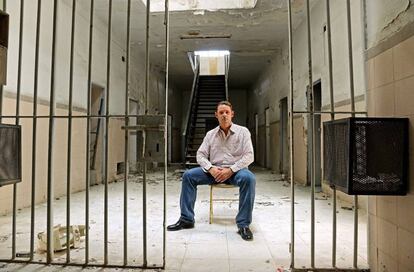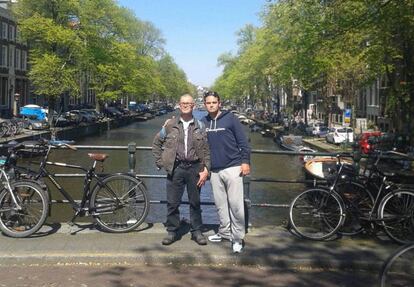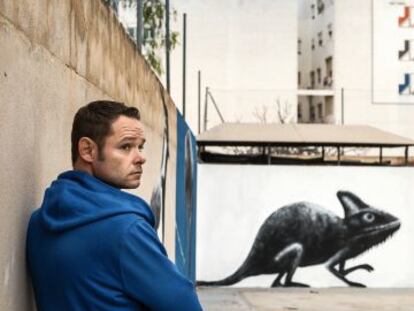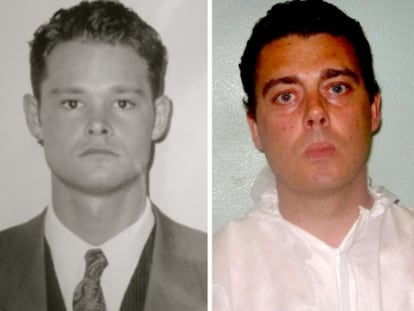Will Dutchman wrongly jailed in Spain for three rapes find justice?
After 12 years in prison for crimes he didn¡¯t commit, Van der Dussen seeks €6 million


What price would you put on your freedom if you had spent years in prison for crimes you didn¡¯t commit ¨C if, say, you had been robbed of the chance of having children and a decent job? Dutchman Romano van der Dussen has come up with the sum of €6 million. That is the figure he is seeking in compensation for the 12 and-a-half-years he was locked away; money that may go some way to making up for the psychological and physical toll his time inside have taken.
Van der Dussen suffers from incontestable psychological damage, both acute and chronic
Jos¨¦ de Miguel Pueyo
Van der Dussen suffers from incontestable psychological damage, both acute and chronic Jos¨¦ de Miguel Pueyo
Soon after he entered prison, Van der Dussen was beaten up so brutally he spent three weeks in the prison hospital. Unable to guarantee his safety, guards then placed him in solitary confinement for 18 months, during which time he spent 23 hours a day completely alone. He went on to spend the rest of his sentence being transferred from one prison to another, always in secure units for child molesters and rapists.
While Van der Dussen was behind bars his mother died. He also became an uncle without ever meeting his nephews, and his family grew divided over his guilt, with his younger sister, who is a police officer, refusing to believe his innocence, arguing that in Europe it was impossible for somebody to be locked up for a crime they did not commit.

But his conviction was based solely on an identity parade, with no physical evidence linking him to the rapes. The fingerprints found at the three crime scenes were not his, and neither was the DNA. In fact, Spanish police had been aware since 2007 that the real culprit was probably Londoner Mark Dixie, already in prison for murder and rape.
However, it wasn¡¯t until last year when a DNA sample definitively proved Dixie had committed at least one of the rapes that Spain¡¯s High Court finally moved to revise Van der Dussen¡¯s sentence.
On the surface of things, it looks as though Van der Dussen is coping with life on the outside. Since his release eight months ago, he¡¯s rented a flat, written a book with the Dutch novelist Edwin Winkels due out soon, and for three months he held down a job as a receptionist in a hotel in Palma de Mallorca. But on closer examination, it is clear that his experience has taken a devastating toll on his mental health. He trips over his words when he speaks and he¡¯s highly-strung. He needs anti-depressants, he has panic attacks and suffers from agoraphobia, anxiety and obsessive-compulsive disorder.
It would be reasonable to think that Van der Dussen might want to leave Spain and its associations behind him when he finally got out. But a love affair that blossomed with a prison volunteer during his sentence has kept him in Mallorca. The two are now in a stable relationship, one that helps anchor him to normal life.

It is his girlfriend, a university graduate, who has motivated Van der Dussen to find work and establish routines that allow for a more balanced existence. But it is a slow and painful process. While working as a receptionist, it appeared as though he was on track, but signs of anxiety and stress in front of the guests prompted his dismissal.
¡°Perhaps I wasn¡¯t ready to work,¡± he says. ¡°But I felt good. I felt good when I showered and shaved in the mornings and when I got the bus looking smart with all the other people going to work. It also made me feel good to be using my German, Dutch and English ¨C languages I speak well ¨C to deal with guests from those countries. I felt as though I was fitting back in and that was really great after spending 12 and-a-half years in jail. But there¡¯s no doubt that I got extremely stressed if 20 people turned up at reception at once and something went wrong. It¡¯s a long time to be away from the world.¡±
¡°Everything in prison is scheduled,¡± says Van der Dussen¡¯s girlfriend, who prefers to remain anonymous. ¡°It¡¯s all routine and the prisoners always know what is going to happen, which is why it¡¯s so hard when you come out into normal life and have to deal with surprises.¡±
During Van der Dussen¡¯s years behind bars, he would dream of strolling along the beach, imagining it was the only thing he needed to be happy. ¡°Now he realizes it¡¯s not so easy to adapt to ordinary life,¡± says his girlfriend. ¡°In some respects, things are going really well. He¡¯s started to make friends and build a social life but he gets depressed a lot. He needs therapy, medical attention and a clear structure to his life.¡±
In a bid to overcome his anxiety, Van der Dussen has recently started to meditate and attend relaxation workshops that he says help him appreciate his achievements. ¡°At least I¡¯ve managed to get a few of the basics sorted,¡± he says. ¡°My flat is clean, the fridge is full, I iron all my clothes. When my girlfriend comes over, everything seems okay. I buy her flowers and plants and make food. I love her so much. And though I don¡¯t really want to, I¡¯m going to start seeing a psychiatrist.¡±
Psychiatrist Jos¨¦ de Miguel Pueyo, who assessed Van der Dussen for his compensation claim, speaks about ¡°incontestable psychological damage, both acute and chronic (¡) that interferes with his daily life.¡±
In prison everything is routine, which is why the surprises of normal life are so hard when you come out Van der Dussen's girlfriend
De Miguel states that Van der Dussen suffers from panic attacks, obsessive-compulsive disorder, depression and anxiety ¨C conditions that, according to his assessment, ¡°began and developed during his imprisonment, becoming acute in the last two or three years.¡±
While inside, Van der Dussen was picked on by other inmates for being a rapist, an unacceptable crime according to prison ethics.
Beatings and insults led to six prison transfers and spells of isolation for his own safety. ¡°He had an impulsive personality to start with, but his ordeal has generated high levels of anxiety due to post-traumatic stress,¡± says De Miguel. ¡°He hasn¡¯t just had his freedom taken from him, he has also suffered at the hands of prison justice for being a rapist. This additional punishment came in the form of death threats, beatings and isolation. So now he¡¯s always on the move, always on high alert.¡±
¡°The damage is huge,¡± adds De Miguel. ¡°On top of it all, he has missed out on opportunities at a critical period of his life, both personally and professionally. His life has been compromised and it¡¯s going to take a great effort to get back to normal. Right now, his relationship with his girlfriend is helping him to survive.¡±
Since the High Court has only absolved him of one of the three rape convictions, Van der Dussen is still fighting to clear his name concerning the other two which were committed the same night, at the same time, and in the same area. Mark Dixie claims not to remember committing these other two attacks as he suffers from blackouts. Meanwhile, Van der Dussen can only seek compensation for the rape he was absolved of.
The Ministry of Justice still has to evaluate Van der Dussen¡¯s compensation claim. The largest figure awarded in Spain for a miscarriage of justice to date is the €1 million paid to Cadiz resident Rafael Ricardi, who spent almost 13 years in jail for crimes he didn¡¯t commit ¨C the sum he sought was €10 million.
Romano van der Dussen is now waiting to see how Spain¡¯s courts measure the value of the jobs he was unable to take, the relationships and children he was unable to have and the strolls along the beach that were denied him.
English version by Heather Galloway.
Tu suscripci¨®n se est¨¢ usando en otro dispositivo
?Quieres a?adir otro usuario a tu suscripci¨®n?
Si contin¨²as leyendo en este dispositivo, no se podr¨¢ leer en el otro.
FlechaTu suscripci¨®n se est¨¢ usando en otro dispositivo y solo puedes acceder a EL PA?S desde un dispositivo a la vez.
Si quieres compartir tu cuenta, cambia tu suscripci¨®n a la modalidad Premium, as¨ª podr¨¢s a?adir otro usuario. Cada uno acceder¨¢ con su propia cuenta de email, lo que os permitir¨¢ personalizar vuestra experiencia en EL PA?S.
?Tienes una suscripci¨®n de empresa? Accede aqu¨ª para contratar m¨¢s cuentas.
En el caso de no saber qui¨¦n est¨¢ usando tu cuenta, te recomendamos cambiar tu contrase?a aqu¨ª.
Si decides continuar compartiendo tu cuenta, este mensaje se mostrar¨¢ en tu dispositivo y en el de la otra persona que est¨¢ usando tu cuenta de forma indefinida, afectando a tu experiencia de lectura. Puedes consultar aqu¨ª los t¨¦rminos y condiciones de la suscripci¨®n digital.










































